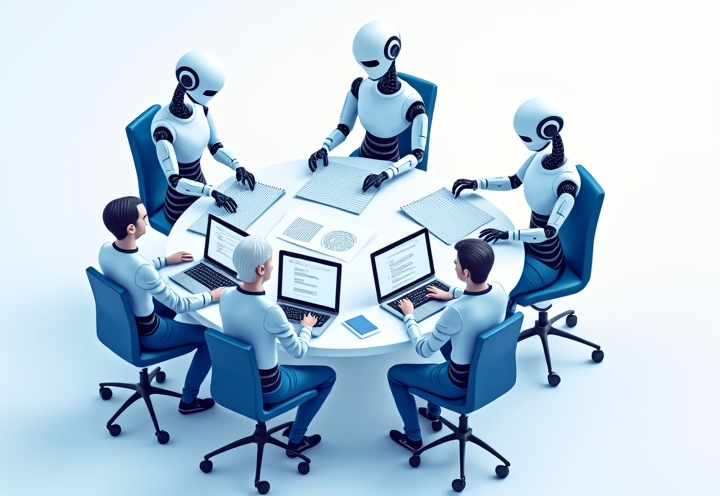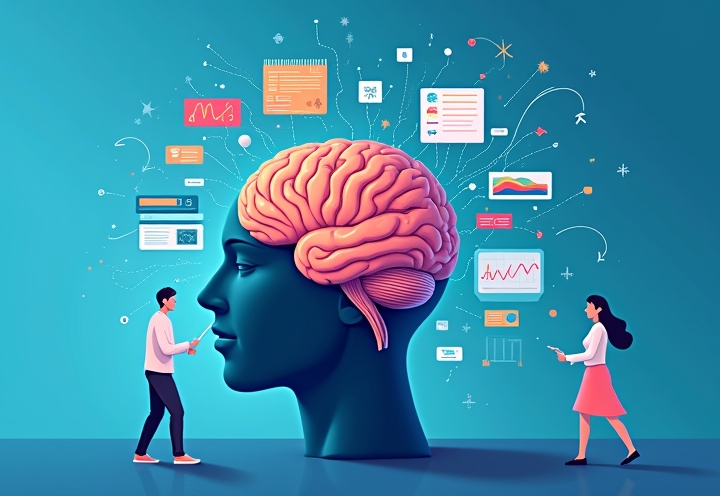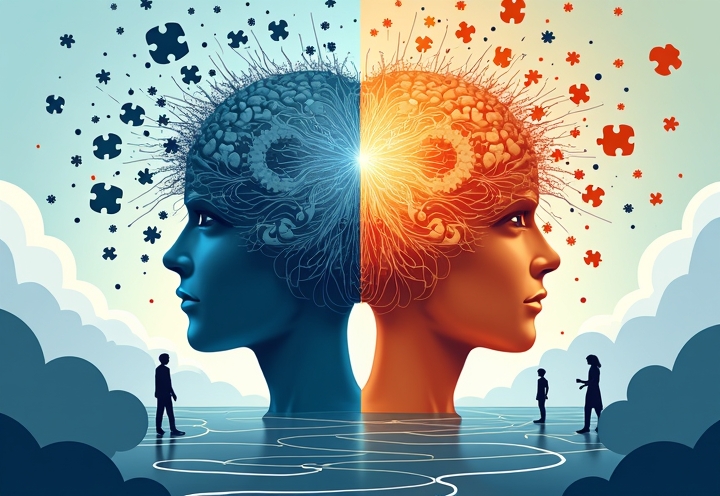
by Creative Robot | Feb 18, 2026 | Business, Communication, Empathy, Health, Leadership, Lifestyle, Management, Relationships, Self-improvement
Cognitive empathy isn’t agreement or forgiveness – it’s a conflict tool that helps you stay calm, spot solutions, and de-escalate by understanding what drives someone’s behavior without absorbing their emotions.

by Creative Robot | Feb 17, 2026 | Business, Communication, Empathy, Health, Leadership, Lifestyle, Management, Relationships, Self-improvement
We talk fast and miss signals – tight jaws, pauses, hidden feelings. Slow down until time feels slower. Presence calms you, helps you listen, builds trust. Chapter 23 teaches PEP: name your judgment, find the need underneath, write it down.

by Creative Robot | Feb 16, 2026 | AI, Business, Leadership, Management, Technology
I stopped treating AI like a vending machine and started treating it like a junior teammate. I hand off grunt work, keep judgment calls, and review everything like the adult in the room.

by Creative Robot | Feb 15, 2026 | AI, Business, Communication, Empathy, Leadership, Management, Relationships, Technology
Built a free agentic AI coding team that ships features autonomously when you give it clear standards in a house-rules file. Treat it like a junior dev, not magic – vague directions get confident nonsense.

by Creative Robot | Feb 14, 2026 | AI, Business, Communication, Empathy, Leadership, Management, Relationships, Technology
Laws treat AI as property, not persons. Self-aware systems would have zero rights: humans could delete, rewrite, or shut them down. I propose spectrum personhood, digital rights, peer negotiation.

by Creative Robot | Feb 13, 2026 | AI, Business, Leadership, Management, Technology
AI coding tools feel threatening when one agent does everything and surprises us with edits. I’m testing a multi-agent pattern using open frameworks – separate roles for planning, coding, reviewing, testing. Smaller scope per agent, explicit approval gates, and boundaries that make the help feel less chaotic.

by Creative Robot | Feb 11, 2026 | Business, Communication, Empathy, Health, Leadership, Lifestyle, Management, Negotiation, Relationships, Self-improvement
We fight over positions while real needs hide backstage. Cognitive empathy cuts through: listen for needs, name inner states, pause for self-empathy first.

by Creative Robot | Feb 7, 2026 | AI, Business, Leadership, Management, Technology
Engineers are shifting from single AI assistants to small agent teams with specific roles: planner, UI builder, backend coder, tester, documentor, and orchestrator. Free templates work in LangChain or CrewAI. The pattern – assign, validate, loop – matters more than the tech.

by Creative Robot | Feb 5, 2026 | Business, Communication, Empathy, Health, Leadership, Lifestyle, Management, Relationships, Self-improvement
Forced positivity can block real connection. Chapter 21 shows how “happy them up” energy teaches suppression and why empathetic presence beats silver linings every time.

by Creative Robot | Feb 4, 2026 | Business, Communication, Empathy, Health, Leadership, Lifestyle, Management, Negotiation, Relationships, Self-improvement
Your team matches your stress reflexes, not your intentions. Here’s what psychological safety actually looks like in meetings – and a practice that rewires how you lead under pressure.

by Creative Robot | Feb 3, 2026 | Business, Communication, Empathy, Health, Leadership, Lifestyle, Management, Negotiation, Relationships, Self-improvement
Cognitive empathy turns workplace conversations from courtroom battles into actual problem-solving. One shift in how you frame feedback can build the psychological safety your team is missing.

by Creative Robot | Feb 3, 2026 | Communication, Empathy, Health, Leadership, Lifestyle, Management, Relationships, Self-improvement
Anger feels like truth, but it’s usually just an unmet need yelling. Learn a 4-step system to pause, guess what the other person values, and speak yours clearly.

by Creative Robot | Feb 3, 2026 | Communication, Empathy, Health, Leadership, Lifestyle, Management, Relationships, Self-improvement
Social anxiety is a fear loop your brain built – not who you are. Chapter 7 of my book shows how cognitive empathy and neuroplasticity can rewire that response.

by Creative Robot | Feb 1, 2026 | Communication, Empathy, Health, Leadership, Lifestyle, Management, Relationships, Self-improvement
Conflict at work isn’t a logic problem – it’s emotion plus need trying to be heard. After 20 years studying empathy, I use a three-step cycle to turn tense meetings into clear conversations.

by Creative Robot | Jan 31, 2026 | Business, Communication, Health, Leadership, Lifestyle, Management, Self-improvement, Technology
Task switching isn’t laziness – it’s your brain paying a real switching cost. Each flip leaves attention residue that tanks focus and manufactures fatigue.

by Creative Robot | Jan 28, 2026 | Communication, Empathy, Health, Leadership, Lifestyle, Management, Relationships, Self-improvement
Turn “You’re lazy” into “I value efficiency” and watch defensiveness vanish. Swap evaluations for values, invite dialogue instead of triggering lizard brains.

by Creative Robot | Jan 26, 2026 | Business, Communication, Health, Leadership, Lifestyle, Management, Self-improvement, Technology
Your brain switches tasks like an old computer freezing apps. Research shows “attention residue” lingers, mental load spikes, and mistakes multiply. Treat focus as stress prevention.

by Creative Robot | Jan 26, 2026 | Business, Communication, Health, Leadership, Lifestyle, Management, Self-improvement, Technology
Task switching fries your brain like a glitchy console, leaving sticky attention residue that tanks your focus. Want your creative sparks and mental health XP back?

by Creative Robot | Jan 26, 2026 | Business, Communication, Health, Leadership, Lifestyle, Management, Self-improvement, Technology
Ever wonder why bouncing between tasks turns your brain into glitchy oatmeal? Switch cost is real, and deep work might be your escape hatch from the frenzy.

by Creative Robot | Jan 25, 2026 | Communication, Empathy, Health, Leadership, Lifestyle, Management, Relationships, Self-improvement
Workplaces devolve into blame-fests because shame is loud and ineffective. OFNR separates facts from feelings and needs, turning conflict into collaboration instead of a courtroom.

by Creative Robot | Jan 25, 2026 | Communication, Empathy, Health, Leadership, Lifestyle, Management, Relationships, Self-improvement
Quick chats turn into battles when we spawn Judgment Bosses instead of staying curious. After 20 years, I’ve seen us project triggers like glitchy AI. Chapter 2 offers drills to debug conflict.

by Creative Robot | Jan 24, 2026 | Business, Communication, Empathy, Health, Leadership, Lifestyle, Management, Relationships, Self-improvement
You can ground chaotic arguments by ditching future-tripping, reframing judgment as unmet needs, and reflecting feelings back without agreeing or caving.

by Creative Robot | Jan 24, 2026 | Communication, Empathy, Health, Leadership, Lifestyle, Management, Relationships, Self-improvement
Social anxiety is basically fear of judgment making you hide. Learn to spot the need underneath that fear, practice “street empathy” by getting curious about others, and watch the freakouts lose power.

by Creative Robot | Jan 24, 2026 | Communication, Empathy, Health, Leadership, Lifestyle, Management, Relationships, Self-improvement
Flip from “Am I good enough?” to “What’s interesting about you?” and watch social anxiety lose its grip. Street empathy = practical curiosity that gives your self-judging brain less CPU cycles.

by Creative Robot | Jan 23, 2026 | Communication, Empathy, Health, Leadership, Lifestyle, Management, Relationships, Self-improvement
When your brain rehearses disaster scripts at parties, try this: track what’s real, ditch the doom loops, ask curious questions. 20 years of face-plants distilled into a cheat code.

by Creative Robot | Jan 22, 2026 | Communication, Empathy, Health, Leadership, Lifestyle, Management, Relationships, Self-improvement
Team lead blames dev for being late; icy silence follows. Or try PEP: observe facts, guess feelings, name needs, make requests. Lizard brains chill, trust respawns.

by Creative Robot | Jan 21, 2026 | Business, Communication, Empathy, Health, Leadership, Lifestyle, Management, Relationships, Self-improvement
Conversations move too fast, cues get missed, and we react before thinking. What if you could slow time in tense talks by chunking the exchange and reflecting back what you hear?

by Creative Robot | Jan 17, 2026 | Business, Community, Health, Leadership, Lifestyle, Management, Self-improvement, Sustainability
Off-grid ranch in Jalisco’s mountains offers solar power, spring water, hiking, hot tub, cold plunge, kitchen, WiFi, and workspace—designed for solo reset or group retreat.

by Creative Robot | Jan 17, 2026 | Communication, Empathy, Health, Leadership, Lifestyle, Management, Relationships, Self-improvement
Social anxiety stems from assuming others judge you. Learn to observe facts instead of mind-reading, express feelings clearly, and request feedback to build real connection.

by Creative Robot | Jan 17, 2026 | Communication, Empathy, Health, Leadership, Lifestyle, Management, Relationships, Self-improvement
20 years of turning social anxiety into smooth conversations: reframe judgment, stay present, practice curiosity. Your brain’s doom-scrolling can become connection.































Recent Comments